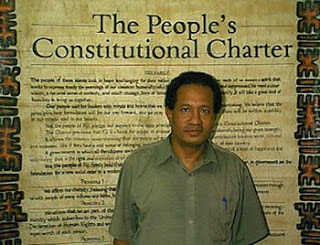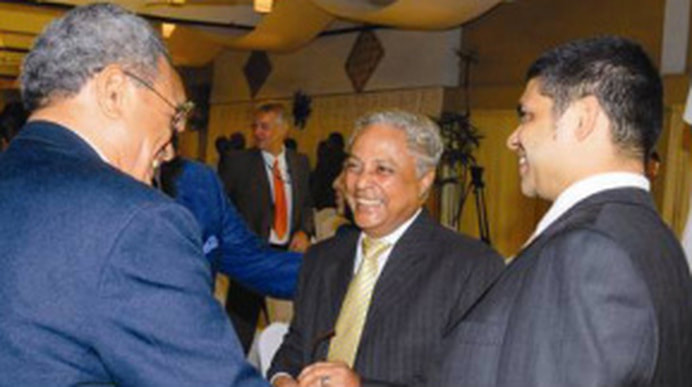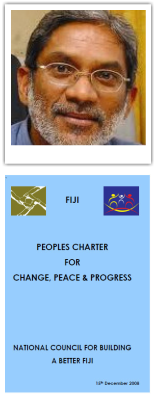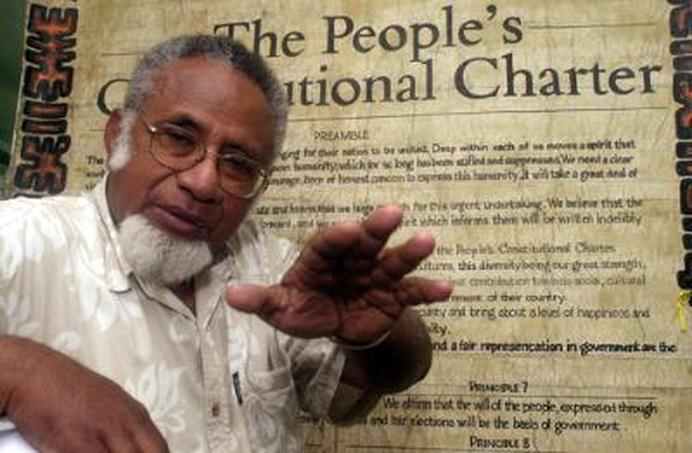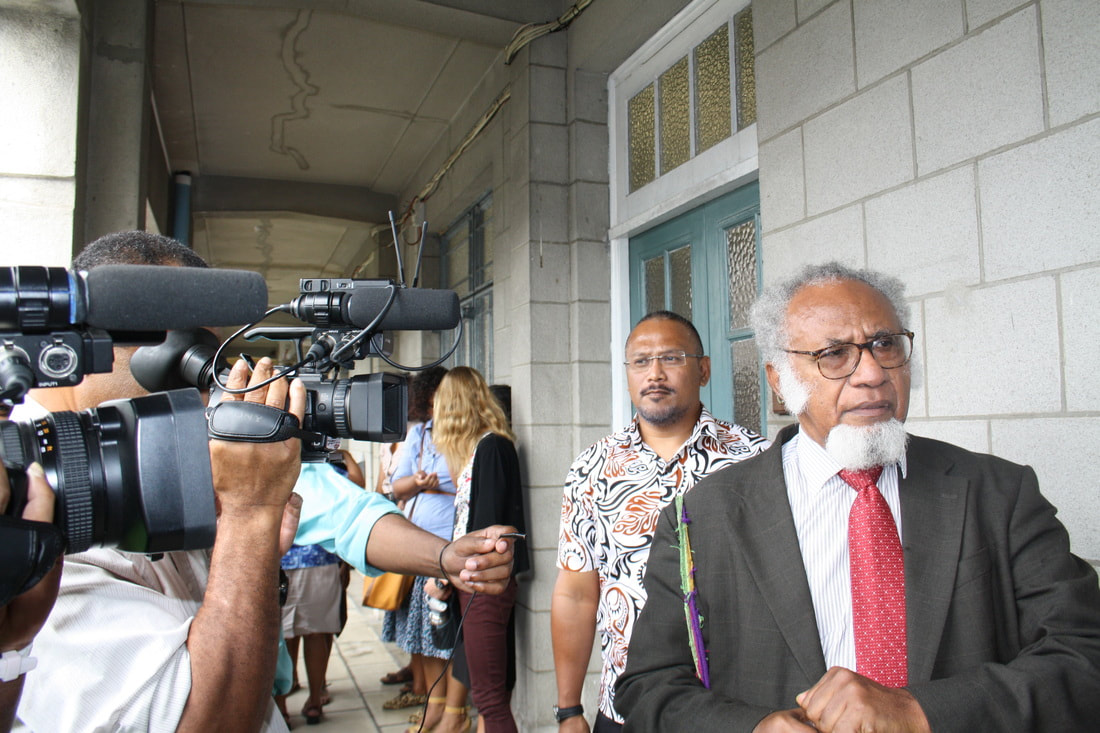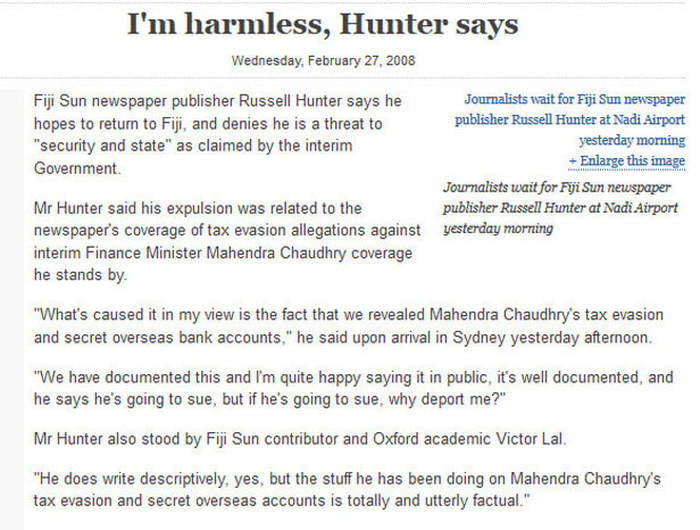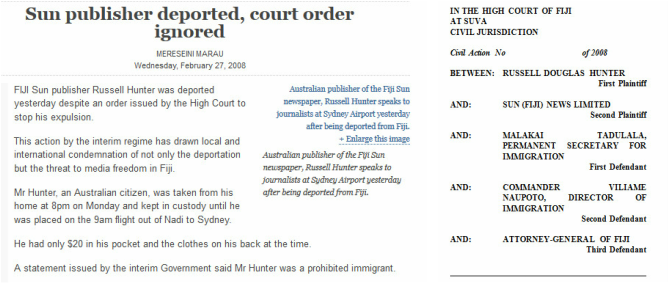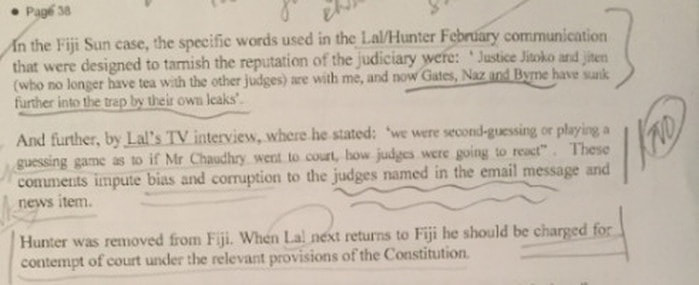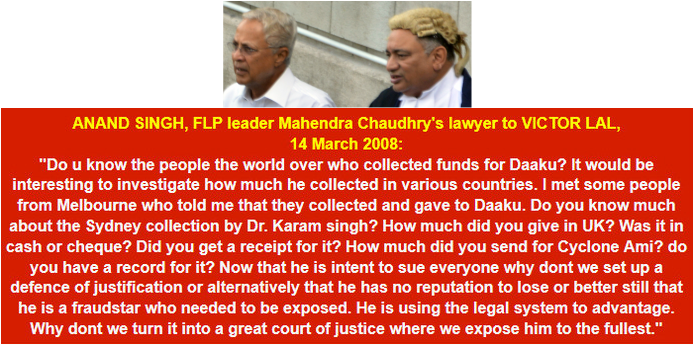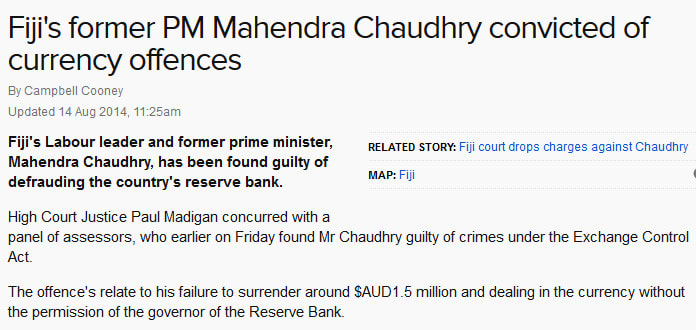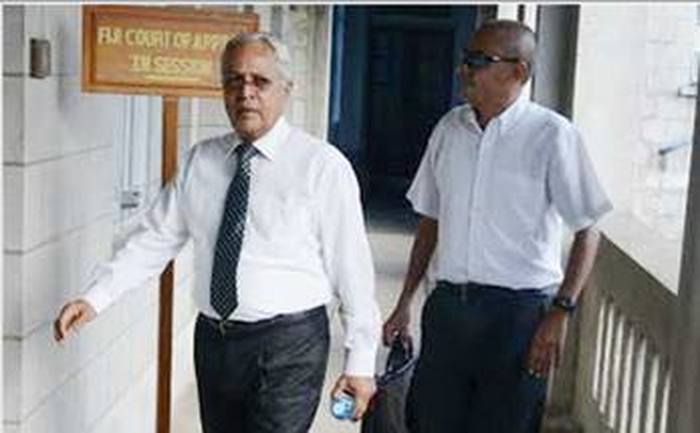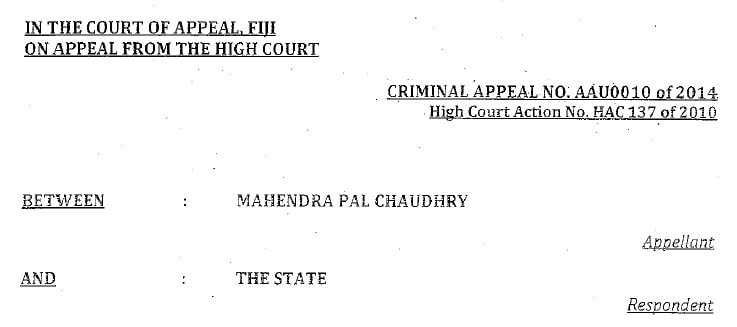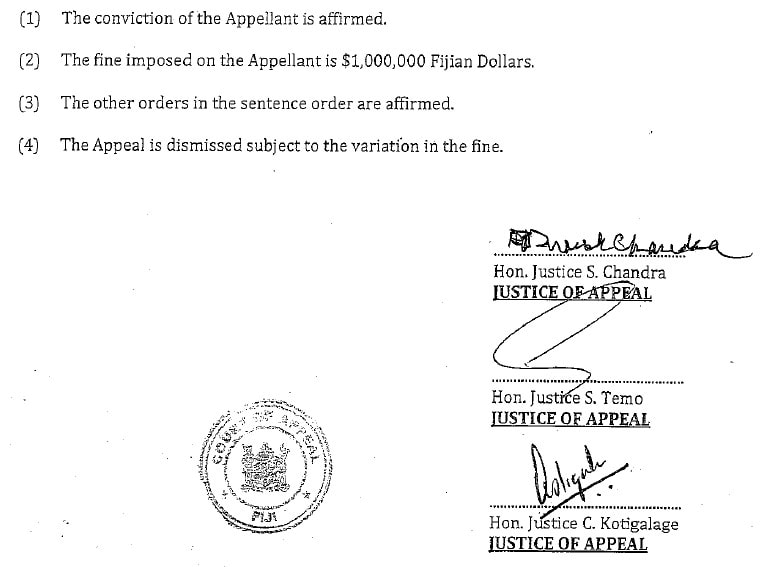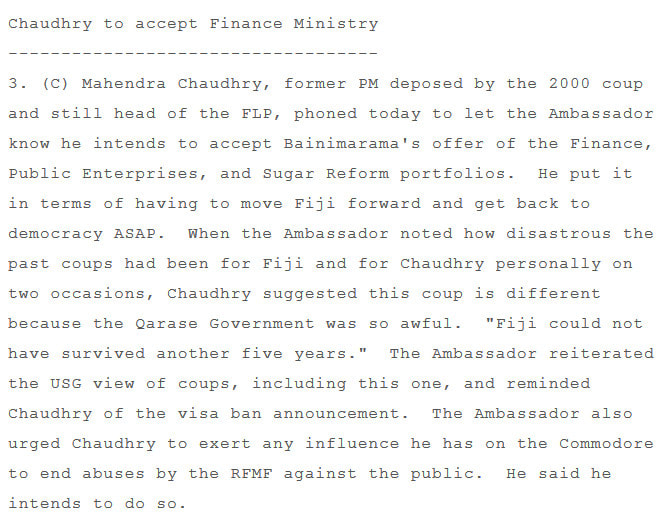"The public impression is that the person who makes all the decisions of this [FFP] government is the “Minister for Everything” Mr Aiyaz Khaiyum. He is the elephant in the room. The rogue elephant."
Jone Dakuvula to FLP convention
Ladies and gentlemen, we do not have a fair legal framework based on principles of accountability, transparency and good governance when the Constitution has declared no one can challenge in a Court of law the validity of the 2013 Constitution, or any Decrees made between December 5, 2006 (the day after the coup) and the first sitting of Parliament 2014.
The Government decreed that there will be no accountability for any illegality, wrong decisions. misuse of public funds, other corruption, criminal acts, including the unlawful overthrow of an elected government.You cannot complain to the Human Rights Commission for any breach of human rights in those eight years. The coup perpetrators have given themselves immunity from prosecution. The Auditor General’s Report for that period have not been released to the public.
The Decrees of that period still apply even though they may be in conflict with the Bill of Rights under the Decreed Constitution (Section 172(3)(4)(5). We cannot change the Constitution unless three quarters of the Members of Parliament approve and then three quarter of the votes of people in a Referendum (Section 160). This is imposed by a Constitution that people had no say in its formation and was not passed by a Parliament.Yet the Preamble begins with WE THE PEOPLE OF FIJI…. declare our commitment to justice, human rights and so on.
The 2013 Constitution is not a fair legal framework because its provisions for change are almost impossible to achieve. It is not impartial when under Section 23(4) of its Bill of Rights, two elected former Prime Ministers, Hon Mahendra Chaudhry and Hon Laisenia Qarase have no political right at all to stand in any Elections. That is the prohibition laid down by those who came to power through the 2006 Military Coup.
So, what’s the meaning of this commitment to human rights and justice in the Preamble?
Parliament under the Decreed 2013 Constitution is a dictatorship and not a democratic body. There is no accountability or consensus there. In the Parliamentary Committees, the Opposition Member’s views, and indeed the public views, of those that appear before those Committees of the Bills, are not respected by the government. We have no influence at all on the Bills the Opposition discuss with the Government members. The Minister responsible for the draft Bills will not accept any changes recommended from the Parliamentary Committees, especially if the Opposition Members have made them.
There is no transparency or respect of the rule of law in this Parliament. Last year the Government, under the guidance of the Attorney General, expelled from Parliament three Members of the Opposition when it had no power under the Parliamentary Powers and Privileges Act to do this. It was also in breach of Parliamentary Standing Orders. Then this was followed up by a Bill to amend the Parliamentary Powers and Privileges Act so Parliament can sit like a High Court and fine Members and citizen up to $100,000 dollars, or imprison them up to five years for the crime of “demeaning the dignity of Parliament”. What does dignity mean in a Parliament that is a mere front for the dictatorship of two men?
Chapters 8 on Accountability, Section 149 of the Constitution requires a law to establish a Code of Conduct applicable to the President, Speaker, Deputy Speaker, Prime Minister, Members of Parliament, Permanent Secretaries, Members of Commissions, Ambassadors, Executives of Statutory Bodies and Public Offices appointed under written law. There is no Code of Conduct Act in place even though it is required under the Constitution. And in the social media we read a lot of allegations of illegal and bad conduct. Now we learn that the Ministry of Information wants to introduce laws and technology to eliminate criticism of Government through the social media such as Facebook.
A Code of Conduct Bill was introduced in 2016 and referred to the Parliamentary Committee. The Code of Conduct Bill has so much wrong with it. It is not intended for serious investigations of corruption, abuse of office, neglect of duty and improper conduct. Complaints against high office holders will not be taken seriously because these can be summarily dismissed as “pure speculation, frivolous, vexatious or politically motivated”. Some public officers and Executive positions in government owned corporations are not included in the Bill. Complainants are required to be secretive and they are not to discuss their grievance with anybody, otherwise their complaint will be summarily dismissed. In other words, you cannot ask anybody for advice before you submit a complaint. The Bill is more about preventing any serious investigation.
Under Section 149(a) of the Constitution, the Government is also required to establish an Accountability and Transparency Commission to be responsible for enforcing compliance of Office holders with the Code of Conduct. No such body has been established by the Government after eleven years in office.
During the early years of its rule, we often heard the Attorney General Aiyaz Khaiyum rabbiting on about the lack of good governance, responsiveness, accountability and transparency, especially of elected governments before the 2006 coup. He often said he is going to introduce good governance qualities and “true democracy”. Well, he has been in office for over a decade. We no longer hear these sanctimonious preaching from him.
Under Part B of the Accountability Chapter of the Decreed Constitution it says:
Section 150 – A written law shall make provision for the exercise by members of the public of the right to access official information and documents held by the Government and its agencies”.
An Official Information Bill was introduced to Parliament last year and referred to the Parliamentary Committee. My NGO, Pacific Dialogue, made submissions to the Committee on this Bill. We found it to be the most ridiculous Bill we have ever read. Its provisions were more about prevention and restriction of official information from being released. To the Chairman of the Committee, Hon Sunil Sudakhar, we contrasted its restrictive provisions with those of Freedom of Information laws in other countries like New Zealand for example. And even submitted to the Committee a draft Freedom of Information Bill made by the Yash Ghai Constitution Commission. We recommended that the Government replace its Bill with that one because it was the most recent model. One and half years have gone and we have not seen their Official Information Bill back in Parliament. Remember that Yash Ghai Constitution Commission and what happened to it? Its Report was burned.
However, in February this year the Attorney General got a Bill for the privatisation of the Fiji Electricity Authority taken to Parliament as an “emergency” legislation, without Members having any opportunity to read it. It was not referred to a Parliamentary Committee for public scrutiny. Mr Khaiyum could not explain why this Bill was emergency under Standing Orders or any public interest justification for it.
This month, before the Prime Minister went to Bonn for the COP23 Conference we read of a $100million flotation by the Reserve Bank of “Green Bond” at 6.3% interest for 13years to establish a fund for climate change damages and renewable energy. This offer to unknown overseas subscribers was made even though Reserve Banks all round the world were getting bond investment at no interest or negative interest rates. I say this is a bogus fund for the indirect privatisation of the Fiji Electricity Authority by unknown foreign investors. You see, if foreign interests want legislative changes to serve their predatory interest, this Government will break all the rules to provide for their need. But if the laws need to change in the public interest of the people of Fiji, the Bills might just make an appearance in Parliament and then put on the back burner and forgotten.
This government is increasingly falling under the control of foreign creditors whose only interest is payment of interest on loans. They are not genuine investors because their interest in Fiji is speculative and short term. If there are problems in the payment of loans, then public assets such as the FEA, the Fiji Ports, Fiji Airports, Air Pacific, Fiji National Provident Fund, the Water Authority, the Reserve Bank, Fiji Development Bank, Housing Finance Corporation, Housing Authority and the others will be sold. You may not know that some of these public enterprises are already partially privatised. It happened during the 8 years before the 2014 Elections.
Privatisation as the means for paying debts has happened in many countries all over the world. In bankrupt Greece for example, 90% of the recent 130 billion-euro dollars of the emergency loans from the European Central Bank and the International Monetary Fund never arrive in the Greek economy because they go to pay overseas creditors and bond holders. State taxers are taken including reduction in pensions and massive layoffs of employers in the public sector had to cease so Greece has to sell off public assets including roads, gas fields, mines and even tourist resorts islands to pay these creditors. This is the future Fiji faces under this Government.
When you have Media Decrees under which the Fiji Times Editor and Publisher are prosecuted for seditious publications, fined $300,000 and have two years suspended jail sentences hanging over them and, another prosecution for seditious publications in Nai Lalakai, how can we have proper democratic accountability of Government through the media? The media is intimidated into silence, self-censorship and suppression of news about Government corruption and abuse of power.
And then we have the Fiji Sun. It had opposed the coup of 2006. So, “principled” was the Fiji Sun between 2006 and 2009 that it used to refuse publication of statements from the Government it then considered illegal. What is the Fiji Sun today? A craven government newspaper that publishes everything the Government wants to publish, will not allow any criticism of the government on its pages, does not publish Opposition statements but only publishes the Attorney General’s attacks on statements of the Opposition that were never published in the Fiji Sun. The Fiji Sun letters to the Editor column gives special privilege to Government supporters to criticise the Opposition parties on issues that were never published in that paper. And where are the Fiji Sun journalists that we so opposed to the 2006 coup? They are still there. The paper is now controlled by a “Training Officer” who is a New Zealand citizen. We need to ask who pays his salary? Why did he come back here to support the Coup regime and remain it’s main apologist and defender?
You may, remember Prime Minister Bainimarama’s first press interview after deposing the elected Government in 2006? He said no one is going to benefit from his coup. It was about cleaning up corruption. In the words, he was selling it as a “Good Governance Coup” and remain its main apologist and defender?
What is accountability and transparency when FB and ASK, according to certain blog sites, are paid more than the Australian and New Zealand Prime Ministers. If this information is incorrect, why not publish the correct information so everyone knows how much our leaders are receiving from taxpayers and external funds?
For that matter, why do we not know how much the Cabinet Members were receiving in salaries between 2007 and 2014 when they were being paid by Dr Nur Bano’s Accountancy firm? No investigation took place because under the Decreed 2013 Constitution, the Government never did anything wrong in its first 8 eight years and, with the non-introduction of a Code of Conduct law, the government remains unaccountable for another 4 years. Are Aiyaz Sayed Khaiyum and Frank Bainimarama getting payoffs for the bogus Green Fund Investment?
Finally, I have to mention the Multinational Observer Group Report and the Electoral Commission Report 2014. They have made many good recommendations to improve the electoral system. Some involve changes to processes and other mean changes to the relevant Decrees. In any genuinely democratic country that believes in free and fair elections, the Government would deal with these recommendations in a transparent and bipartisan manner so that all stakeholder political parties and members of the public can be involved in building consensus for changes to the system before the 2018 Elections.
Instead, the government has replaced the first Electoral Commission with its own political appointments and amended the Electoral Decree so that the reappointed Supervisor of Elections is now directing the Electoral Commission as its Secretary. This has compromised the independence of these offices. This is the Supervisor of Elections that the Court of Appeal had ruled last year that he had unlawfully disobeyed the direction of the Electoral Commission to disqualify candidate Mr. Praveen Bala who is now Minister for Local Government and to allow Steven Singh a Labour Party candidate to stand. Mr Saneem should have resigned because of the Court ruling but he is still there.
The Commission and the Supervisor have rejected most of the recommendations of these Reports, instead of advising the Government on how the Electoral Decrees need to change. The Opposition Parties do not believe there will be free and fair elections in 2018. The Elections will be rigged just as it was in 2014. For those who want to know how it was rigged talk to me after this and I will explain.
We can say that this Government falls short of internationally accepted measures of transparency, accountability and good governance. It has sophisticated public relations through its foreign Media agency QORVIS, but the public is never provided with real information about its decision making and how these are made and why some commitments are not implemented. The public impression is that the person who makes all the decisions of this government is the “Minister for Everything” Mr Aiyaz Khaiyum. He is the elephant in the room. The rogue elephant.
There is so much we can say on this subject of lack of Good Governance, Accountability and Transparency but I will now stop so you can talk about the hope for better things after 2018.
The Government decreed that there will be no accountability for any illegality, wrong decisions. misuse of public funds, other corruption, criminal acts, including the unlawful overthrow of an elected government.You cannot complain to the Human Rights Commission for any breach of human rights in those eight years. The coup perpetrators have given themselves immunity from prosecution. The Auditor General’s Report for that period have not been released to the public.
The Decrees of that period still apply even though they may be in conflict with the Bill of Rights under the Decreed Constitution (Section 172(3)(4)(5). We cannot change the Constitution unless three quarters of the Members of Parliament approve and then three quarter of the votes of people in a Referendum (Section 160). This is imposed by a Constitution that people had no say in its formation and was not passed by a Parliament.Yet the Preamble begins with WE THE PEOPLE OF FIJI…. declare our commitment to justice, human rights and so on.
The 2013 Constitution is not a fair legal framework because its provisions for change are almost impossible to achieve. It is not impartial when under Section 23(4) of its Bill of Rights, two elected former Prime Ministers, Hon Mahendra Chaudhry and Hon Laisenia Qarase have no political right at all to stand in any Elections. That is the prohibition laid down by those who came to power through the 2006 Military Coup.
So, what’s the meaning of this commitment to human rights and justice in the Preamble?
Parliament under the Decreed 2013 Constitution is a dictatorship and not a democratic body. There is no accountability or consensus there. In the Parliamentary Committees, the Opposition Member’s views, and indeed the public views, of those that appear before those Committees of the Bills, are not respected by the government. We have no influence at all on the Bills the Opposition discuss with the Government members. The Minister responsible for the draft Bills will not accept any changes recommended from the Parliamentary Committees, especially if the Opposition Members have made them.
There is no transparency or respect of the rule of law in this Parliament. Last year the Government, under the guidance of the Attorney General, expelled from Parliament three Members of the Opposition when it had no power under the Parliamentary Powers and Privileges Act to do this. It was also in breach of Parliamentary Standing Orders. Then this was followed up by a Bill to amend the Parliamentary Powers and Privileges Act so Parliament can sit like a High Court and fine Members and citizen up to $100,000 dollars, or imprison them up to five years for the crime of “demeaning the dignity of Parliament”. What does dignity mean in a Parliament that is a mere front for the dictatorship of two men?
Chapters 8 on Accountability, Section 149 of the Constitution requires a law to establish a Code of Conduct applicable to the President, Speaker, Deputy Speaker, Prime Minister, Members of Parliament, Permanent Secretaries, Members of Commissions, Ambassadors, Executives of Statutory Bodies and Public Offices appointed under written law. There is no Code of Conduct Act in place even though it is required under the Constitution. And in the social media we read a lot of allegations of illegal and bad conduct. Now we learn that the Ministry of Information wants to introduce laws and technology to eliminate criticism of Government through the social media such as Facebook.
A Code of Conduct Bill was introduced in 2016 and referred to the Parliamentary Committee. The Code of Conduct Bill has so much wrong with it. It is not intended for serious investigations of corruption, abuse of office, neglect of duty and improper conduct. Complaints against high office holders will not be taken seriously because these can be summarily dismissed as “pure speculation, frivolous, vexatious or politically motivated”. Some public officers and Executive positions in government owned corporations are not included in the Bill. Complainants are required to be secretive and they are not to discuss their grievance with anybody, otherwise their complaint will be summarily dismissed. In other words, you cannot ask anybody for advice before you submit a complaint. The Bill is more about preventing any serious investigation.
Under Section 149(a) of the Constitution, the Government is also required to establish an Accountability and Transparency Commission to be responsible for enforcing compliance of Office holders with the Code of Conduct. No such body has been established by the Government after eleven years in office.
During the early years of its rule, we often heard the Attorney General Aiyaz Khaiyum rabbiting on about the lack of good governance, responsiveness, accountability and transparency, especially of elected governments before the 2006 coup. He often said he is going to introduce good governance qualities and “true democracy”. Well, he has been in office for over a decade. We no longer hear these sanctimonious preaching from him.
Under Part B of the Accountability Chapter of the Decreed Constitution it says:
Section 150 – A written law shall make provision for the exercise by members of the public of the right to access official information and documents held by the Government and its agencies”.
An Official Information Bill was introduced to Parliament last year and referred to the Parliamentary Committee. My NGO, Pacific Dialogue, made submissions to the Committee on this Bill. We found it to be the most ridiculous Bill we have ever read. Its provisions were more about prevention and restriction of official information from being released. To the Chairman of the Committee, Hon Sunil Sudakhar, we contrasted its restrictive provisions with those of Freedom of Information laws in other countries like New Zealand for example. And even submitted to the Committee a draft Freedom of Information Bill made by the Yash Ghai Constitution Commission. We recommended that the Government replace its Bill with that one because it was the most recent model. One and half years have gone and we have not seen their Official Information Bill back in Parliament. Remember that Yash Ghai Constitution Commission and what happened to it? Its Report was burned.
However, in February this year the Attorney General got a Bill for the privatisation of the Fiji Electricity Authority taken to Parliament as an “emergency” legislation, without Members having any opportunity to read it. It was not referred to a Parliamentary Committee for public scrutiny. Mr Khaiyum could not explain why this Bill was emergency under Standing Orders or any public interest justification for it.
This month, before the Prime Minister went to Bonn for the COP23 Conference we read of a $100million flotation by the Reserve Bank of “Green Bond” at 6.3% interest for 13years to establish a fund for climate change damages and renewable energy. This offer to unknown overseas subscribers was made even though Reserve Banks all round the world were getting bond investment at no interest or negative interest rates. I say this is a bogus fund for the indirect privatisation of the Fiji Electricity Authority by unknown foreign investors. You see, if foreign interests want legislative changes to serve their predatory interest, this Government will break all the rules to provide for their need. But if the laws need to change in the public interest of the people of Fiji, the Bills might just make an appearance in Parliament and then put on the back burner and forgotten.
This government is increasingly falling under the control of foreign creditors whose only interest is payment of interest on loans. They are not genuine investors because their interest in Fiji is speculative and short term. If there are problems in the payment of loans, then public assets such as the FEA, the Fiji Ports, Fiji Airports, Air Pacific, Fiji National Provident Fund, the Water Authority, the Reserve Bank, Fiji Development Bank, Housing Finance Corporation, Housing Authority and the others will be sold. You may not know that some of these public enterprises are already partially privatised. It happened during the 8 years before the 2014 Elections.
Privatisation as the means for paying debts has happened in many countries all over the world. In bankrupt Greece for example, 90% of the recent 130 billion-euro dollars of the emergency loans from the European Central Bank and the International Monetary Fund never arrive in the Greek economy because they go to pay overseas creditors and bond holders. State taxers are taken including reduction in pensions and massive layoffs of employers in the public sector had to cease so Greece has to sell off public assets including roads, gas fields, mines and even tourist resorts islands to pay these creditors. This is the future Fiji faces under this Government.
When you have Media Decrees under which the Fiji Times Editor and Publisher are prosecuted for seditious publications, fined $300,000 and have two years suspended jail sentences hanging over them and, another prosecution for seditious publications in Nai Lalakai, how can we have proper democratic accountability of Government through the media? The media is intimidated into silence, self-censorship and suppression of news about Government corruption and abuse of power.
And then we have the Fiji Sun. It had opposed the coup of 2006. So, “principled” was the Fiji Sun between 2006 and 2009 that it used to refuse publication of statements from the Government it then considered illegal. What is the Fiji Sun today? A craven government newspaper that publishes everything the Government wants to publish, will not allow any criticism of the government on its pages, does not publish Opposition statements but only publishes the Attorney General’s attacks on statements of the Opposition that were never published in the Fiji Sun. The Fiji Sun letters to the Editor column gives special privilege to Government supporters to criticise the Opposition parties on issues that were never published in that paper. And where are the Fiji Sun journalists that we so opposed to the 2006 coup? They are still there. The paper is now controlled by a “Training Officer” who is a New Zealand citizen. We need to ask who pays his salary? Why did he come back here to support the Coup regime and remain it’s main apologist and defender?
You may, remember Prime Minister Bainimarama’s first press interview after deposing the elected Government in 2006? He said no one is going to benefit from his coup. It was about cleaning up corruption. In the words, he was selling it as a “Good Governance Coup” and remain its main apologist and defender?
What is accountability and transparency when FB and ASK, according to certain blog sites, are paid more than the Australian and New Zealand Prime Ministers. If this information is incorrect, why not publish the correct information so everyone knows how much our leaders are receiving from taxpayers and external funds?
For that matter, why do we not know how much the Cabinet Members were receiving in salaries between 2007 and 2014 when they were being paid by Dr Nur Bano’s Accountancy firm? No investigation took place because under the Decreed 2013 Constitution, the Government never did anything wrong in its first 8 eight years and, with the non-introduction of a Code of Conduct law, the government remains unaccountable for another 4 years. Are Aiyaz Sayed Khaiyum and Frank Bainimarama getting payoffs for the bogus Green Fund Investment?
Finally, I have to mention the Multinational Observer Group Report and the Electoral Commission Report 2014. They have made many good recommendations to improve the electoral system. Some involve changes to processes and other mean changes to the relevant Decrees. In any genuinely democratic country that believes in free and fair elections, the Government would deal with these recommendations in a transparent and bipartisan manner so that all stakeholder political parties and members of the public can be involved in building consensus for changes to the system before the 2018 Elections.
Instead, the government has replaced the first Electoral Commission with its own political appointments and amended the Electoral Decree so that the reappointed Supervisor of Elections is now directing the Electoral Commission as its Secretary. This has compromised the independence of these offices. This is the Supervisor of Elections that the Court of Appeal had ruled last year that he had unlawfully disobeyed the direction of the Electoral Commission to disqualify candidate Mr. Praveen Bala who is now Minister for Local Government and to allow Steven Singh a Labour Party candidate to stand. Mr Saneem should have resigned because of the Court ruling but he is still there.
The Commission and the Supervisor have rejected most of the recommendations of these Reports, instead of advising the Government on how the Electoral Decrees need to change. The Opposition Parties do not believe there will be free and fair elections in 2018. The Elections will be rigged just as it was in 2014. For those who want to know how it was rigged talk to me after this and I will explain.
We can say that this Government falls short of internationally accepted measures of transparency, accountability and good governance. It has sophisticated public relations through its foreign Media agency QORVIS, but the public is never provided with real information about its decision making and how these are made and why some commitments are not implemented. The public impression is that the person who makes all the decisions of this government is the “Minister for Everything” Mr Aiyaz Khaiyum. He is the elephant in the room. The rogue elephant.
There is so much we can say on this subject of lack of Good Governance, Accountability and Transparency but I will now stop so you can talk about the hope for better things after 2018.
"The paper [The Fiji Sun] is now controlled by a “Training Officer” who is a New Zealand citizen. We need to ask who pays his salary? Why did he come back here to support the Coup regime and remain it’s main apologist and defender?" - Dakuvula to FLP convention; he seems to have forgotten another New Zealander John Samy, who came down to shove Peoples Charter down the throats of Fijians, and later fled to NZ
"The draft Peoples Charter for Change, Peace and Progress belongs to the dustbin of history; for it is a regressive document, prepared by a team of individuals (locals and foreigners) who had no mandate from the People of Fiji. It is time for the Fiji Islanders to really make noises, and their noises must be heard around the world. If not, Fiji will continue to be plunged into further darkness, by forces who seem to believe that might is right. And that the taxpayers’ money is there for their taking!" - |

From the Archives
August 2008, Fiji Sun
The Draft Peoples Charter: $2.4million document for dustbin
"The present rulers and their shameless apologists are nothing but mere “tenants” of Fiji’s future; they have no right to use and abuse their powers in the name of people, including the drafting of the Charter
By VICTOR LAL
A member of the National Council for Building a Better Fiji had whetted my anticipation to Himalayan heights, making me stay up late into the English night, for he had sent me an advance copy of the draft People’s Charter for Change, Peace and Progress shortly before its official release to the much maligned media, and indirectly, to the Fiji Islanders.
The NCBBF member had, however, attached a grumbling note to the draft copy: “Sorry, this is all they could come up with, despite a budget of $2.4million.” Curiously, he neither defended nor apologised for his own involvement in the preparation of the 38-page post-coup document, which is most likely to end up in the dustbin of history, or as I have recommended, it be placed in a $2.4million “coup museum”.
Now, after a sombre reflection, the NCBBF member says that he is actually shameful of the document and its contents but is too scared to register any dissension. He claims that he had been taken for a ride – in fact, Fiji has been taken for a ride. But let us hope, and without God’s intervention, that the draft charter’s journey will be cut short, and for a variety of compelling reasons.
It is instructive to recall that a member of the NCBBF, Father David Arms, the principle architect of the recommendation for electoral reform, had urged the NCBBF members to take advantage of the military coup, and by extension the absence of parliamentary democracy, and accept his recommendation for the introduction of proportional voting system. Fathers Arms said there was a need to abolish the communal seats as it “is complicated, leads to unfair results and divides the people ethnically”.
He said, “As the military regime was more or less acting outside the Constitution, the NCBBF should take the opportunity to push through the electoral reforms and amend the Constitution, by taking advantage of the military authority and ignoring the legal constitutional requirements for making such changes”. His prayers have been heeded, for the draft charter wants changes to the electoral system.
The charter maintains that the electoral system is one of the ways to ensure sustainable democracy and good and just governance in Fiji. It wants to abolish the communal representation system provided for under the 1997 Constitution and the Electoral Act 1998, and replace this with the use of a common roll system for all future elections.
The NCBBF wants to establish, as it claims, a fair system of voting so that all the interests and wishes of the people of Fiji can be represented in the Parliament as expressed through free, fair and honest elections and for this, we should adopt an Open List Proportional Representation (PR) Electoral and Voting System.
The draft charter proposed to incorporate specific anti-discrimination measures into Fiji’s electoral laws, to ensure no person is discriminated against, by political parties on the grounds of race, religion, gender or circumstance.
It also wants to from remove the multi-party government clause, the mandatory power sharing arrangement as provided for under the Constitution. As well, it proposes lowering the voting age from 21 to 18 years of age, and wants to maintain compulsory registration but calls for the abolition compulsory voting.
The draft charter wants the electoral system removed from the Constitution and enacted as law so that it may be amended and reformed from time to time according to the will of the people. However, it suggests that the fundamental recommendations of non-ethnic voting, equal franchise and Proportional Representation be enshrined in the Constitution. It says Fiji’s electoral system is racially discriminatory and undemocratic.
It adds that the United Nations Convention on Discrimination and the Right to Universal and Equal Suffrage requires each individual vote to be equal in value. The current communal system of representation entrenches inequalities, by not providing one value for one vote, has contributed to the “coup culture”, and the consequent ethnic-based politics that has impeded our national development. The draft charter says it commits the country to a free and fair electoral process, that promotes one people, one nation and one identity.
There is nothing fundamentally wrong with the electoral system, except, maybe, the concept of mandatory power sharing in the Constitution. It is perverse to recommend changes to the electoral system on the basis that the 2006 general election was rigged, or because the party favoured by the military, the Fiji Labour Party, had not won the last general elections.
Yes, the above arguments are not in the draft charter, but one assumes that these arguments featured into the formulation of the final recommendations, based on the post-coup “official investigations” and FLP statements and pronouncements. What went really wrong, leading to the coup, was that the multi-party cabinet was not given time to work out some of the major differences between the different parties, and once the coup took place, the FLP did not stand up to defend human rights, the rule of law, and democracy. Instead, its leader took up a Cabinet position, and only recently claimed that the coup was necessary to “save the economy”.
Meanwhile, as I have consistently critiqued, most of the arguments in the draft charter do not hold up to scrutiny. I will be commenting upon various aspects of the charter later on, but suffice to plead with the nation, we should not be disheartened by the draft charter, for history is on our side, provided the Constitution, as the charter maintains, remains the supreme law of the land. After every coup in Fiji, men and women of good and bad intentions have come out to “Move Fiji Forward”, and the present lot in the NCBBF are no exception. In drafting the Peoples Charter, however, they had the mighty power of the guns behind them, and a cool $2.4millions of the taxpayers’ money.
We must, to use the Churchillian phrase, “Never Surrender” to those who had no mandate from the people to draft the charter. As I have consistently maintained, the military and its shadowy coup backers, had not gone to the people for permission to execute the coup, so they have no right to come to the people for the endorsement of the draft charter. This lot should stand for election and subject their charter to a national referendum.
And, the NCBBF must not, even feebly, dare to invoke the President’s name, to claim legitimacy. Digressing, it is time President Ratu Josefa Iloilo made a weekly appearance on the presidential lawn to address the nation or publicly endorse all future laws and decrees, which the interim regime claims he has endorsed at Government House. He is the people’s President and he must be seen and heard by the people!
The NCBBF’s proposed draft charter is a re-incarnation of the late Professor Asesela Ravuvu’s Constitutional Review Commission, albeit for different reasons, and it should be meted out the same fate, but without the support of the FLP, which was in the forefront of driving a death knell to it. We may recall that Professor Ravuvu was the architect of the racist 1990 Constitution after the 1987 coups. In 1988, he and I had bitterly clashed across the table at the British Foreign and Commonwealth Office seminar on post-coup Fiji in London. Among the participants was Ratu Epeli Nailatikau, who had been deposed as army commander by Sitiveni Rabuka’s coup but had later accepted to go up to London as Fiji’s post-coup high commissioner.
Many of Professor Ravuvu’s views which he was trying to formulate at the London conference later found their way into his 1991 book, Fiji: The Façade of Democracy, and in 2000, he re-surfaced to chair the CRC after the Speight coup. A similar pattern is discernable in the deliberations and papers of the NCBBF members, who want to do “A Ravuvu” after the 2006 coup – to shove their vision of Fiji through the draft Peoples Charter.
In September 2000, the FLP had denounced the composition of the Ravuvu commission charged with “reviewing” the 1997 Constitution. But the judiciary, in the person of Justice Anthony Gates, put a stop to its forward march and imposition on the nation. He later delivered another judgment, which should be a salutary warning to the drafters and backers of the Peoples Charter.
In Jokapeci Koroi & Ors v Commissioner of Inland Revenue & the Attorney-General, Lautoka High Court, Civil Action No 0179/2001L, Justice Gates declared: “Unruly persons are unlikely to seek validation for their usurpations from judges. Nor should the courts give their sanction when application is eventually made under the doctrine of effectiveness, for there is no such force behind it. In this regard, I respectfully differ from [Hans] Kelsen. Judges should expect and anticipate that the usurpers will see them removed. So be it. Judges do not represent the law. The doctrine of effectiveness has no moral underpinning, and judges do no honourable business therefore in according lawfulness to de facto administrations.”
And as I have written elsewhere, the present rulers of Fiji and their shameless apologists are nothing but mere “tenants” of Fiji’s future; they have no right to use and abuse their powers in the name of the people. In the path of the usurpers stands the 1997 Constitution and the Judiciary, and I have no doubt that the judges will choose the Constitution and not the Peoples Charter.
In case, the “People” of Fiji have let down their guard, another New Zealander has appeared on the scene, chosen to take the draft charter to the people. His name is Pat Craddock. The NCBBF chief John Samy, who came down from New Zealand to head the NCBBF, claims that Mr Craddock is the perfect choice as he has previous experience in Fiji. Can Mr Samy tell us how much are the taxpayers paying this man, a former senior audio producer with the USP and later journalism lecturer?
Interestingly, in 2000 Mr Craddock had taken a swipe at Professor Ravuvu’s appointment to head the CRC, pointing out the late professor’s views in the book The Façade of Democracy. He went on to note in the Pacific Media Watch (20 June 2000): “When and if the former Prime Minister (Mahendra Chaudhry) and the other 30 hostages emerge pale-faced but safe from the cells of Parliament, it will only be a short time before they talk loud and often to a waiting world media. I am not sure that guns and threats can silence these and other voices. It looks like being a long, dark and also a noisy night for Fiji.”
Well, when Mr Craddock and his team take the draft Peoples Charter to the people, they should not hesitate to shout back at them, and through them, to the interim regime: “We have had enough of repression and suppression. Tell the regime to take the charter and go to hell. We need election, democracy, rule of law, human right, and bread and butter for our families. And want to see a detailed breakdown of how our $2.4million was spent on preparing this charter.”
The draft Peoples Charter for Change, Peace and Progress belongs to the dustbin of history; for it is a regressive document, prepared by a team of individuals (locals and foreigners) who had no mandate from the People of Fiji. It is time for the Fiji Islanders to really make noises, and their noises must be heard around the world.
If not, Fiji will continue to be plunged into further darkness, by forces who seem to believe that might is right. And that the taxpayers’ money is there for their taking!
August 2008, Fiji Sun
The Draft Peoples Charter: $2.4million document for dustbin
"The present rulers and their shameless apologists are nothing but mere “tenants” of Fiji’s future; they have no right to use and abuse their powers in the name of people, including the drafting of the Charter
By VICTOR LAL
A member of the National Council for Building a Better Fiji had whetted my anticipation to Himalayan heights, making me stay up late into the English night, for he had sent me an advance copy of the draft People’s Charter for Change, Peace and Progress shortly before its official release to the much maligned media, and indirectly, to the Fiji Islanders.
The NCBBF member had, however, attached a grumbling note to the draft copy: “Sorry, this is all they could come up with, despite a budget of $2.4million.” Curiously, he neither defended nor apologised for his own involvement in the preparation of the 38-page post-coup document, which is most likely to end up in the dustbin of history, or as I have recommended, it be placed in a $2.4million “coup museum”.
Now, after a sombre reflection, the NCBBF member says that he is actually shameful of the document and its contents but is too scared to register any dissension. He claims that he had been taken for a ride – in fact, Fiji has been taken for a ride. But let us hope, and without God’s intervention, that the draft charter’s journey will be cut short, and for a variety of compelling reasons.
It is instructive to recall that a member of the NCBBF, Father David Arms, the principle architect of the recommendation for electoral reform, had urged the NCBBF members to take advantage of the military coup, and by extension the absence of parliamentary democracy, and accept his recommendation for the introduction of proportional voting system. Fathers Arms said there was a need to abolish the communal seats as it “is complicated, leads to unfair results and divides the people ethnically”.
He said, “As the military regime was more or less acting outside the Constitution, the NCBBF should take the opportunity to push through the electoral reforms and amend the Constitution, by taking advantage of the military authority and ignoring the legal constitutional requirements for making such changes”. His prayers have been heeded, for the draft charter wants changes to the electoral system.
The charter maintains that the electoral system is one of the ways to ensure sustainable democracy and good and just governance in Fiji. It wants to abolish the communal representation system provided for under the 1997 Constitution and the Electoral Act 1998, and replace this with the use of a common roll system for all future elections.
The NCBBF wants to establish, as it claims, a fair system of voting so that all the interests and wishes of the people of Fiji can be represented in the Parliament as expressed through free, fair and honest elections and for this, we should adopt an Open List Proportional Representation (PR) Electoral and Voting System.
The draft charter proposed to incorporate specific anti-discrimination measures into Fiji’s electoral laws, to ensure no person is discriminated against, by political parties on the grounds of race, religion, gender or circumstance.
It also wants to from remove the multi-party government clause, the mandatory power sharing arrangement as provided for under the Constitution. As well, it proposes lowering the voting age from 21 to 18 years of age, and wants to maintain compulsory registration but calls for the abolition compulsory voting.
The draft charter wants the electoral system removed from the Constitution and enacted as law so that it may be amended and reformed from time to time according to the will of the people. However, it suggests that the fundamental recommendations of non-ethnic voting, equal franchise and Proportional Representation be enshrined in the Constitution. It says Fiji’s electoral system is racially discriminatory and undemocratic.
It adds that the United Nations Convention on Discrimination and the Right to Universal and Equal Suffrage requires each individual vote to be equal in value. The current communal system of representation entrenches inequalities, by not providing one value for one vote, has contributed to the “coup culture”, and the consequent ethnic-based politics that has impeded our national development. The draft charter says it commits the country to a free and fair electoral process, that promotes one people, one nation and one identity.
There is nothing fundamentally wrong with the electoral system, except, maybe, the concept of mandatory power sharing in the Constitution. It is perverse to recommend changes to the electoral system on the basis that the 2006 general election was rigged, or because the party favoured by the military, the Fiji Labour Party, had not won the last general elections.
Yes, the above arguments are not in the draft charter, but one assumes that these arguments featured into the formulation of the final recommendations, based on the post-coup “official investigations” and FLP statements and pronouncements. What went really wrong, leading to the coup, was that the multi-party cabinet was not given time to work out some of the major differences between the different parties, and once the coup took place, the FLP did not stand up to defend human rights, the rule of law, and democracy. Instead, its leader took up a Cabinet position, and only recently claimed that the coup was necessary to “save the economy”.
Meanwhile, as I have consistently critiqued, most of the arguments in the draft charter do not hold up to scrutiny. I will be commenting upon various aspects of the charter later on, but suffice to plead with the nation, we should not be disheartened by the draft charter, for history is on our side, provided the Constitution, as the charter maintains, remains the supreme law of the land. After every coup in Fiji, men and women of good and bad intentions have come out to “Move Fiji Forward”, and the present lot in the NCBBF are no exception. In drafting the Peoples Charter, however, they had the mighty power of the guns behind them, and a cool $2.4millions of the taxpayers’ money.
We must, to use the Churchillian phrase, “Never Surrender” to those who had no mandate from the people to draft the charter. As I have consistently maintained, the military and its shadowy coup backers, had not gone to the people for permission to execute the coup, so they have no right to come to the people for the endorsement of the draft charter. This lot should stand for election and subject their charter to a national referendum.
And, the NCBBF must not, even feebly, dare to invoke the President’s name, to claim legitimacy. Digressing, it is time President Ratu Josefa Iloilo made a weekly appearance on the presidential lawn to address the nation or publicly endorse all future laws and decrees, which the interim regime claims he has endorsed at Government House. He is the people’s President and he must be seen and heard by the people!
The NCBBF’s proposed draft charter is a re-incarnation of the late Professor Asesela Ravuvu’s Constitutional Review Commission, albeit for different reasons, and it should be meted out the same fate, but without the support of the FLP, which was in the forefront of driving a death knell to it. We may recall that Professor Ravuvu was the architect of the racist 1990 Constitution after the 1987 coups. In 1988, he and I had bitterly clashed across the table at the British Foreign and Commonwealth Office seminar on post-coup Fiji in London. Among the participants was Ratu Epeli Nailatikau, who had been deposed as army commander by Sitiveni Rabuka’s coup but had later accepted to go up to London as Fiji’s post-coup high commissioner.
Many of Professor Ravuvu’s views which he was trying to formulate at the London conference later found their way into his 1991 book, Fiji: The Façade of Democracy, and in 2000, he re-surfaced to chair the CRC after the Speight coup. A similar pattern is discernable in the deliberations and papers of the NCBBF members, who want to do “A Ravuvu” after the 2006 coup – to shove their vision of Fiji through the draft Peoples Charter.
In September 2000, the FLP had denounced the composition of the Ravuvu commission charged with “reviewing” the 1997 Constitution. But the judiciary, in the person of Justice Anthony Gates, put a stop to its forward march and imposition on the nation. He later delivered another judgment, which should be a salutary warning to the drafters and backers of the Peoples Charter.
In Jokapeci Koroi & Ors v Commissioner of Inland Revenue & the Attorney-General, Lautoka High Court, Civil Action No 0179/2001L, Justice Gates declared: “Unruly persons are unlikely to seek validation for their usurpations from judges. Nor should the courts give their sanction when application is eventually made under the doctrine of effectiveness, for there is no such force behind it. In this regard, I respectfully differ from [Hans] Kelsen. Judges should expect and anticipate that the usurpers will see them removed. So be it. Judges do not represent the law. The doctrine of effectiveness has no moral underpinning, and judges do no honourable business therefore in according lawfulness to de facto administrations.”
And as I have written elsewhere, the present rulers of Fiji and their shameless apologists are nothing but mere “tenants” of Fiji’s future; they have no right to use and abuse their powers in the name of the people. In the path of the usurpers stands the 1997 Constitution and the Judiciary, and I have no doubt that the judges will choose the Constitution and not the Peoples Charter.
In case, the “People” of Fiji have let down their guard, another New Zealander has appeared on the scene, chosen to take the draft charter to the people. His name is Pat Craddock. The NCBBF chief John Samy, who came down from New Zealand to head the NCBBF, claims that Mr Craddock is the perfect choice as he has previous experience in Fiji. Can Mr Samy tell us how much are the taxpayers paying this man, a former senior audio producer with the USP and later journalism lecturer?
Interestingly, in 2000 Mr Craddock had taken a swipe at Professor Ravuvu’s appointment to head the CRC, pointing out the late professor’s views in the book The Façade of Democracy. He went on to note in the Pacific Media Watch (20 June 2000): “When and if the former Prime Minister (Mahendra Chaudhry) and the other 30 hostages emerge pale-faced but safe from the cells of Parliament, it will only be a short time before they talk loud and often to a waiting world media. I am not sure that guns and threats can silence these and other voices. It looks like being a long, dark and also a noisy night for Fiji.”
Well, when Mr Craddock and his team take the draft Peoples Charter to the people, they should not hesitate to shout back at them, and through them, to the interim regime: “We have had enough of repression and suppression. Tell the regime to take the charter and go to hell. We need election, democracy, rule of law, human right, and bread and butter for our families. And want to see a detailed breakdown of how our $2.4million was spent on preparing this charter.”
The draft Peoples Charter for Change, Peace and Progress belongs to the dustbin of history; for it is a regressive document, prepared by a team of individuals (locals and foreigners) who had no mandate from the People of Fiji. It is time for the Fiji Islanders to really make noises, and their noises must be heard around the world.
If not, Fiji will continue to be plunged into further darkness, by forces who seem to believe that might is right. And that the taxpayers’ money is there for their taking!
THEN MY DICTATOR FRIENDS CAME FOR ME! Akuila Yabaki : ANOTHER one from the Peoples Charter shown the door and dragged to court
"And then we have the Fiji Sun. It had opposed the coup of 2006. So, “principled” was the Fiji Sun between 2006 and 2009 that it used to refuse publication of statements from the Government it then considered illegal. What is the Fiji Sun today? A craven government newspaper that publishes everything the Government wants to publish, will not allow any criticism of the government on its pages..."
Dakuvula to FLP convention; he forgot to remind FLP leader and the 'good and the bad' at the convention that The Fiji Sun passed into the hands of the present journalists after Bainimarama-Khaiyum-Chaudhry trio expelled its former publisher Russell Hunter when he published VICTOR LAL's expose of the then Interim Minister of Finance Mahendra Chaudhry's $2million in a Sydney account. Investigative Journalism died in Fiji on 24 February 2008, on Hunter's deportation to Australia, and saw the introduction of the current Media Decree to hold the press down. Peter Lomas was brought to Fiji to temporarily manage the paper while Hunter was challenging his deportation; in the end, the Interim Regime frustrated Hunter's legal challenge, and Lomas stayed on at the Fiji Sun
Fijileaks: Jone Dakuvula had spelled out to the FLP convention the following as he understood:
GOVERNANCE
“Governance is the manner of steering or governing or directing and controlling a group of people or state. Governance is “the process of decision making and the process by which decisions are implemented, or not implemented”. (Wikipedia)
Governance is related to politics in that politics is defined as “the art of governance”.
Eight key elements of good governance:
ACCOUNTABILITY
Basically, it means being able to account for one’s actions. In other words, governance is being willing to be answerable, to give account for ones’ actions, to accept blame and liability for wrong actions and their consequences which means punishment by law for misconduct.
Accountability cannot exist without proper accounting practises. In the absence of accounting procedure, there is no accountability. (For example, the function of an independent Auditor General’s Office and a Parliment Public Accounts Committee).
Political accountability means the accountability of the government, politicians and civil servants to the public and to Parliament. In Parliament, the government relies on the support of Parliament, which has the power to hold the government to account. Parliament in some countries can pass a vote of no confidence in the Government, but in theory only, under Fiji Parliament, as you know.
In a democracy, regular elections and the existence of, and effective functioning of other non-government institution are important to the accountability of leaders in government. These institutions are strong civil society organisations, independent news media, effective political parties, and auditors. Also, vital, are Independent Universities that conduct research, publish and comment publicly with expertise about concerns of people, including the decisions and activities of Government.
TRANSPARENCY
Political transparency means to hold public officials accountable and fight corruption. Openness, accountability and honesty define Government transparency. In a free society, transparency is a government obligation to share information with its citizens. It is at the heart of how citizens hold public officials accountable. (Wikipedia)
GOVERNANCE
“Governance is the manner of steering or governing or directing and controlling a group of people or state. Governance is “the process of decision making and the process by which decisions are implemented, or not implemented”. (Wikipedia)
Governance is related to politics in that politics is defined as “the art of governance”.
Eight key elements of good governance:
- The rule of law, which means fair legal framework that are enforced by impartial regulatory bodies
- Transparency
- Responsiveness
- Consensus oriented
- Equity and inclusiveness
- Effectiveness and efficiency
- Accountability
- Participation
- Voice and accountability
- Political stability
- Lack of violence
- Government effectiveness
- Regulatory quality through the rule of law
- Control of Corruption
ACCOUNTABILITY
Basically, it means being able to account for one’s actions. In other words, governance is being willing to be answerable, to give account for ones’ actions, to accept blame and liability for wrong actions and their consequences which means punishment by law for misconduct.
Accountability cannot exist without proper accounting practises. In the absence of accounting procedure, there is no accountability. (For example, the function of an independent Auditor General’s Office and a Parliment Public Accounts Committee).
Political accountability means the accountability of the government, politicians and civil servants to the public and to Parliament. In Parliament, the government relies on the support of Parliament, which has the power to hold the government to account. Parliament in some countries can pass a vote of no confidence in the Government, but in theory only, under Fiji Parliament, as you know.
In a democracy, regular elections and the existence of, and effective functioning of other non-government institution are important to the accountability of leaders in government. These institutions are strong civil society organisations, independent news media, effective political parties, and auditors. Also, vital, are Independent Universities that conduct research, publish and comment publicly with expertise about concerns of people, including the decisions and activities of Government.
TRANSPARENCY
Political transparency means to hold public officials accountable and fight corruption. Openness, accountability and honesty define Government transparency. In a free society, transparency is a government obligation to share information with its citizens. It is at the heart of how citizens hold public officials accountable. (Wikipedia)

